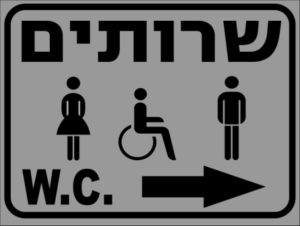So you’re going on Birthright, and you want some basic Hebrew knowledge? Well go no further. Here’s the Top 12 Hebrew Words and Phrases To Know Before Coming To Israel.
Transliteration pronunciation key:
A = Ah as in Saw
E = Eh as in Led
I = Ee as in Leech
Ih = Ih as in Tick
O = Oh as in Oh Gee
U= Oo as in Food
h = guttural ch sound, like you’re choking
12) Wow! Really?!? You don’t say?!?
-אני ראיתי את אמא שלך אתמול בערב
-וואלה?
-וואלה
-Ani ra’iti et ima shelcha (f subject: shelach) etmol be’erev
-Walla?
-Walla
I saw your mother last night. Really? Really. Walla is Israeli slang that comes from Arabic, which literally means “swear to G-d”.
11) Cool bro
סבבה
Sababah
Sababah is an Arabic word that has become Israeli slang, and basically means cool or great! How was your falafel!? Sababah.
10) Have patience
רק רגע
Rak rega
Rak Rega (just a sec), is something you might hear from a store clerk if they’re not ready yet. You can also use it condescendingly to impatient Israelis in a line. It’s usually accompanied by a person putting their thumb, pointer, and middle fingers together and waving them in your face. You might also just get the fingers with a little click of the tongue.
9) I don’t actually want to buy anything, I’m just looking
לא תודה. רק מסתכל(ת)
Lo todah, rak mistakel (f: mistakelet)
The go-to assumption if you’re in a store and an employee walks up to you. They’ll probably be asking if you need any help, to which you can respond the above (if you actually need help, see #1).
8) Greetings, sister!
בוקר טוב/צהריים טובים/ערב טוב/לילה טוב
Boker tov/Tzaharayim tov/Erev tov/Lilah tov
Respectively, Good Morning (Boker), Good Afternoon (Tzaharayim-Not often used), Good Evening (Erev), and Good Night (Lilah). A nice greeting and a smile goes a long way, even in Israel!
7) How you doin’?
מה נשמע? מה עניינים? מה קורה?
Mah nishma? Mah anyanim? Mah Koreh?
Respectively, What’s up? (nishma), How are things? (anyanim), and What’s happening? (koreh). All are typical and appropriate greetings. Appropriate responses might be hakol beseder (all is good), beseder gamur (fine), or shum d’var (nothing). For religious people, you’ll often hear baruch hashem (praise be G-d), which means “Thanks to the big man upstairs, I’ve got nothing to complain about”.
6) How do you say… ?
איך אומרים… בעברית?
Eich omrim … [English word] b’Ivrit?
How do say “pickles” in Hebrew? For the inquisitive among us, this phrase will help you learn Hebrew in a jiffy.
5) I would very much like something to eat
אפשר פלאפל/שוורמה בפיתה/לאפה?
חמוצים, כרוב, חומוס, סלט, בצל, חריף, צ׳יפס, חציל… קצת
Efshar falafel/shawarmah b’pita/lafah?
Toppings: hamutzim, k’ruv, humus, salat, batzal, harif, chips, hatzil… k’tzat
In English: pickles, cabbage, humus, salad (often chopped tomatoes and cucumbers), onion, spicy sauce, french fries, and eggplant… a little
How do you order a meal b’Ivrit? The first sentence asks, “Is is possible to get a falafel/shawarmah in a pita/lafah?”. In Hebrew, the word efshar is actually used as “Can I have…?”, or “Can I order…?”, and can be used in making any request. Most places, you can choose your toppings. They’ll often say and point to the topping, and you can respond ken (yes), lo (no), or k’tzat (a little). K’tzat comes before the noun, so you’d say k’tzat salat, for example.
4) Where are your facilities?
איפה /יש שירותים?
Eifoh/Yesh shirutim?
Where are/Do you have a bathroom? A must know in any foreign country.
3) HOW MUCH IS IT???
כמה זה עולה?
Kamah zeh oleh?
How much is this? Use this whenever you don’t know the price. If you’re at a place where you can barter, like the shuk, a reply of “Lo, zeh yoter midai”, no, that’s too expensive, and starting to walk away, can get you a better deal.
2) I’m sorry, I have no idea what you’re saying!
סליחה, אני לא יודע(ת)
Selichah, ani lo yodea (female: yoda’at)
This phrase is best used when someone stops you on the street and asks you something in Hebrew, and you have no idea what they said or where they’re asking you directions to.
1) Uh, do… you… speak… English?
אני לא מדבר(ת) עיברית. אתה (את) מדבר(ת) אנגלית?
Ani lo medaber (f speaker: medaberet) Ivrit. Atah (f subject: At) medaber (f subject: medaberet) Anglit?
I don’t speak Hebrew. Do you speak English?
Bonus Words: Davka, Mamash, Kerah
Davka can mean a number of things, but generally means that someone is doing something on purpose, in a negative way, ie. “just to annoy”. She davka only drives on Shabbat.
Mamash (pronounced in Hebrew as ma-mash, with the accent on the second half, or in Yiddish as ma-mihsh, with the accent on the first syllable) means “really”. Used to stress something. Tommy would mamash love this.
Kerah (ice) is a must have have word coming from the western world. While you may be used to ice in your drinks, you have to ask for it in restaurants in Israel. Efshar Coca Cola im kerah? Could I get Coca Cola with ice, please? (although I recommend drinking it out of the glass bottle if they have it, it tastes much better!)
Any must use phrases that you would suggest? Share them in the comments below!
Enjoy your trip to Israel!




